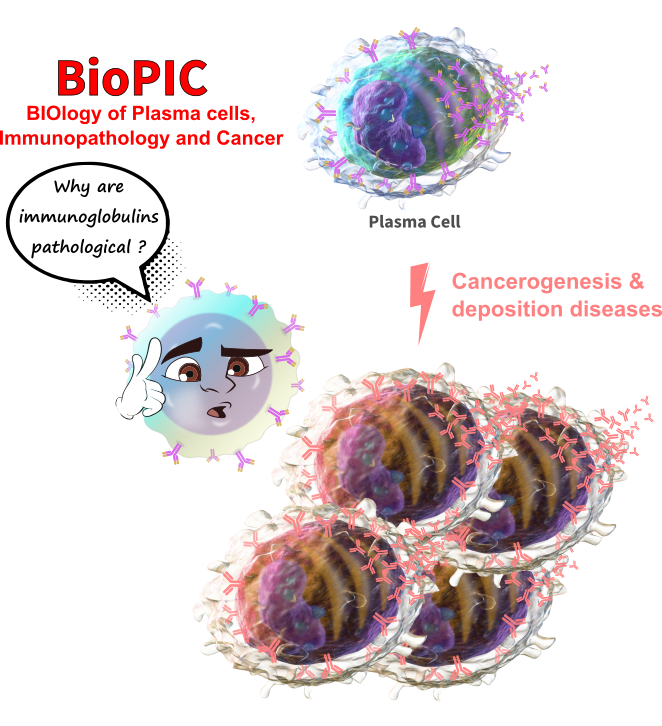Axis Plasma cell and cancerogenesis – Team BioPIC
Presentation
The work of the team Biology of Plasma Cells, Immunopathology and Cancer (BioPIC) is mainly focused on plasma cells (antibody-secreting cells), both normal and cancerous, the regulation of immunoglobulin (Ig) expression in these cells and the toxicity of some Ig (antibodies) in particular during plasma cell proliferation (Ig deposition diseases).
Our main study tools are transgenic animals producing abnormal (pathogenic, truncated) Ig and other gene modifications in a constitutive or inducible manner, approaches to modulate gene expression by antisense oligos (ASO), high throughput sequencing of Ig repertoires and transcriptome, targeted genome modification techniques by Crispr-Cas9 as well as classical molecular and cellular biology techniques.
We also benefit from privileged access to patient samples via our clinicians and our association with the National Reference Center for AL amyloidosis and other monoclonal Ig deposit diseases. (https://www.unilim.fr/cr-amylose-al/).
Research topics
– Development and analysis of experimental models (in vitro and in vivo) of immunoglobulin deposition diseases including monoclonal Ig deposition diseases (such as AL amyloidosis, Randall-type monoclonal Ig deposition disease, Fanconi syndrome, etc.) and IgA nephropathies (Berger disease).
– Clinical research and development of new diagnostic and therapeutic tools for Ig deposition diseases (high throughput sequencing of Ig repertoires, new molecules in the treatment of AL amyloidosis).
– Use of ASOs (modulation of Ig expression) and depositional disease models to study the toxicity of abnormal (incomplete or pathogenic) Ig in plasma cells.
– Role of Ig (quantity/quality) in the response to proteasome inhibitor treatments (“gold standard” in the treatment of plasma cell proliferations such as multiple myeloma).
– Development of anti-sense strategies targeting Ig transcripts to modulate Ig expression. Use of these strategies for the treatment of pathologies (Allergies, AL amyloidosis, Multiple Myeloma).
– Gene inhibition by anti-sense strategies. Various anti-sense strategies are developed to induce the inhibition of genes involved in pathologies (oncogenes, plasma cell differentiation…). Development of an ASO screening tool (https://cribl.shinyapps.io/ExonSkipper).
– Role of mRNA nonsense-mediated decay (NMD) and splicing factors in normal and pathological plasma cell development.



